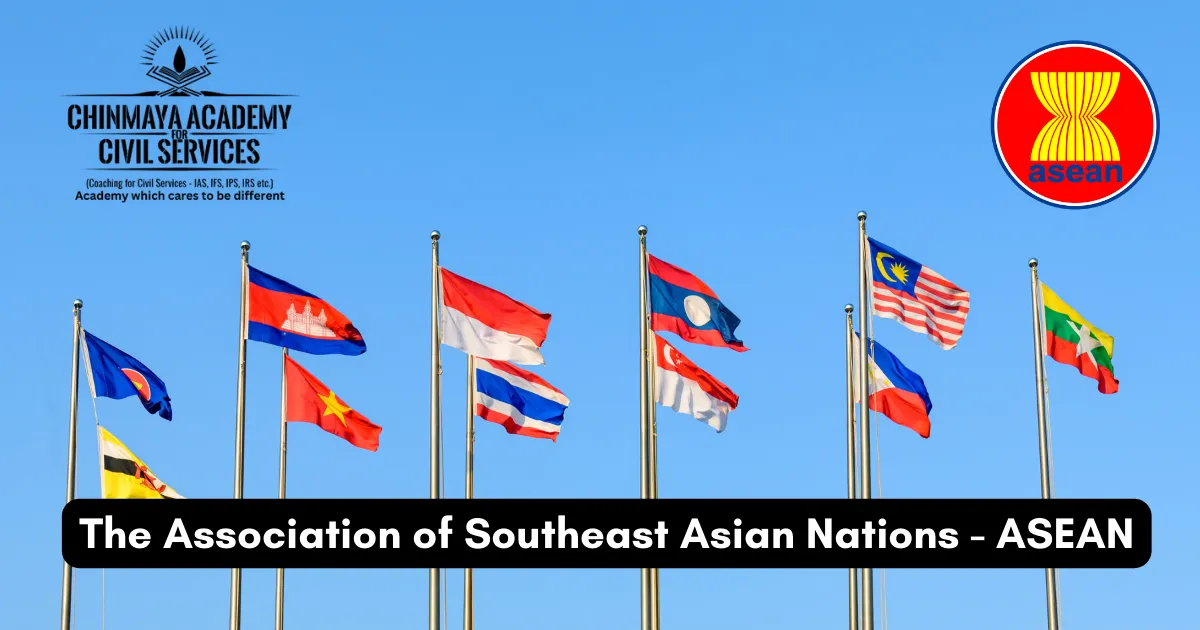
The Association of Southeast Asian Nations, or ASEAN, was established in 1967 with the signing of the ASEAN Declaration (Bangkok Declaration) by Indonesia, Malaysia, Philippines, Singapore and Thailand. The motto of ASEAN is “One Vision, One Identity, One Community”. Its secretariat is situated in Jakarta, Indonesia.
Member Nations
- Indonesia
- Malaysia
- Philippines
- Singapore
- Thailand
- Brunei
- Vietnam
- Laos
ASEAN Aims
The aims and purposes of ASEAN as per ASEAN Declaration are:
- accelerate the economic growth, social progress and cultural development in the region
- promote regional peace and stability among countries of the region
- promote collaboration and mutual assistance in the economic, social, cultural, technical, scientific and administrative fields
- provide assistance for training and research facilities in the spheres of education, profession, technical and administration
- encourage effective collaboration in agriculture, industry, and trade to further their growth
- promote Southeast Asian studies
- maintain close and beneficial cooperation with existing international and regional organisations
Fundamental Principles
The Treaty of Amity and Cooperation in Southeast Asia (TAC) of 1976 laid down the fundamental principles to be followed by ASEAN member states
- Mutual respect for the independence, sovereignty, equality, territorial integrity, and national identity of all nations;
- The right of every State to lead its national existence free from external interference, subversion or coercion;
- Non-interference in the internal affairs of one another;
- Settlement of differences or disputes by peaceful manner;
- Renunciation of the threat or use of force; and
- Effective cooperation among themselves.
Evolution of ASEAN
- Treaty of Amity and Cooperation in Southeast Asia (1976)
- Treaty on the Southeast Asia Nuclear Weapon-Free Zone (1995)
- Adoption of ASEAN Vision 2020 (1997)
- Bali Concord II for the establishment of an ASEAN Community (2003)
- Cebu Declaration, to accelerate the establishment of the ASEAN Community by 2015 (2007)
- ASEAN Charter came into force and became a legally binding agreement (2008)
- Launch of ASEAN Community (2015)
ASEAN Summit
It is the highest policy-making body in ASEAN. It comprises of the Heads of State of ASEAN Member States. The ASEAN Summit Meetings are held twice annually. It aims to provide policy guidance and take decisions on key issues related to the objectives of ASEAN
ASEAN Forums
ASEAN Regional Forum (ARF)
- Launched in 1993
- 27 members
- Aims to facilitate cooperation on political and security issues
ASEAN Plus Three
- Initiated in 1997
- Includes China, Japan, and South Korea to form ASEAN’s ten members
East Asia Summit (EAS)
- Launched in 2005
- Seeks to promote security and prosperity in the region
- It includes Australia, China, India, Japan, New Zealand, Russia, South Korea, and the United States.
ASEAN Defence Ministers Meeting (ADMM)-Plus Meeting
- Aims to strengthen security and defense cooperation for peace, stability, and development in the region.
- This includes Australia, China, India, Japan, New Zealand, South Korea, Russian Federation, and the United States.
Recent development
India attended the 10th ASEAN Defence Ministers Meeting (ADMM)-Plus Meeting held at Indonesia. India became an ASEAN dialogue partner in 1992, and the inaugural ADMM-Plus was convened in 2010.
Maritime Security
- India is committed to the freedom of navigation, overflight, and unimpeded lawful commerce in international waters.
- It expressed support towards the 1982 United Nations Convention on the Law of the Sea (UNCLOS)
- It also called for more consultative and development-oriented regional security initiatives that reflects larger consensus among various stakeholders
Counter-terror group
- The maiden ASEAN-India maritime exercise (AIME) was held in South China Sea in the month of May.
- India and Indonesia are co-chairs of ASEAN’s expert working group on humanitarian assistance and disaster relief activities in the 2020-2023 cycle.
- India has proposed to co-chair the expert working group on counter-terrorism.
 Chinmaya IAS Academy – Current Affairs Chinmaya IAS Academy – Current Affairs
Chinmaya IAS Academy – Current Affairs Chinmaya IAS Academy – Current Affairs
